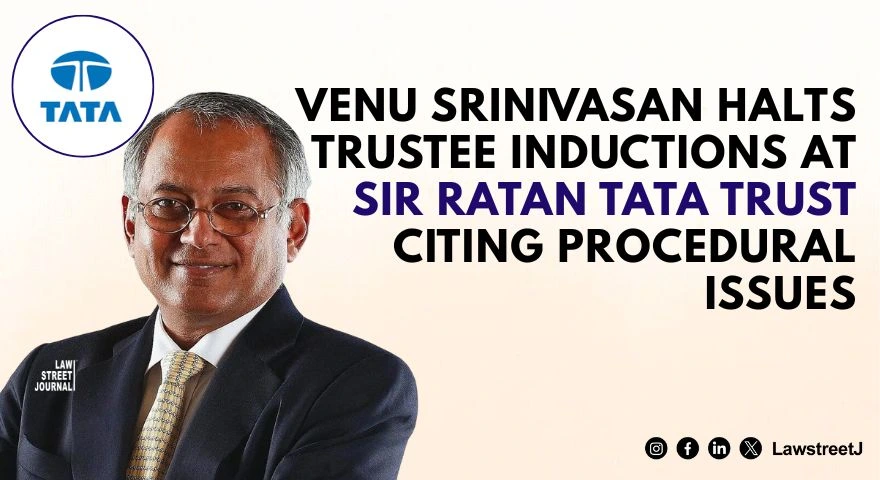New Delhi: A governance issue has emerged inside the Sir Ratan Tata Trust (SRTT) after Vice-Chairman Venu Srinivasan objected to the induction of Neville Tata and Bhaskar Bhat as trustees. His objection, raised during a board meeting on November 11, was based on procedural grounds and resulted in the proposal being deferred. The development has turned attention to internal processes within one of India’s oldest charitable institutions. People aware of the meeting said the proposal to induct Neville Tata and Bhaskar Bhat was introduced under the section titled “Any other items,” rather than as a listed agenda point. Srinivasan reportedly stated that such an appointment required advance circulation and inclusion in the official agenda before discussion.
As per trust governance norms, the appointment of new trustees generally requires prior notice to all board members and detailed discussion. Because these steps were not followed, the resolution was not passed. Both proposed appointees had earlier been inducted the same day into the Sir Dorabji Tata Trust (SDTT), another key body under the Tata philanthropic network, without any reported objection. The contrast between the two meetings has highlighted procedural differences across the trusts.
Context Within the Tata Trusts Network
The Sir Ratan Tata Trust and the Sir Dorabji Tata Trust together hold more than 51 per cent of the equity in Tata Sons, the holding company of the Tata Group. The trusts form the foundation of the group’s philanthropic and governance framework, and decisions taken by their boards often influence the direction of the wider conglomerate. During the November 11 meeting, the SRTT board also approved the dissolution of its executive committee, which had been managing operational decisions. With that change, full authority for administrative and policy matters now rests with Chairman Noel Tata. People familiar with the discussion said the change was intended to bring decisions directly under the chairman’s supervision. However, governance observers have pointed out that consolidation of control must operate within the trust’s formal procedures to maintain transparency and balance.
Appointments to charitable trusts are guided by the Indian Trusts Act, 1882, and by the internal rules written into each trust’s founding documents. Standard practice requires that proposed resolutions, especially those involving trustee appointments, be circulated in advance so that members have adequate time for review and discussion. Srinivasan’s objection was based on the fact that the proposal appeared under “Any other items,” a category normally reserved for minor or urgent issues. Under governance norms, trustee appointments are considered substantive matters and should therefore be part of the formal agenda. Legal experts note that a lack of prior notice in such cases could raise procedural concerns, even if the underlying intent of the appointment is legitimate. They also point out that transparency in trustee selection helps protect charitable institutions from potential disputes and ensures accountability in financial and policy decisions.
For now, the halted induction does not amount to a legal violation, but the board will likely revisit the proposal at a later meeting once formal notice requirements are fulfilled. Neville Tata, son of Chairman Noel Tata, has been associated with various Tata entities and represents the next generation of the family in trust management. Bhaskar Bhat, a long-time Tata Group executive and former Managing Director of Titan Company Ltd., has also served on several group boards. Their appointment to the Sir Dorabji Tata Trust earlier in the day proceeded smoothly, suggesting agreement on their inclusion within the broader Tata Trusts framework, though procedural rules prevented parallel induction at SRTT. Noel Tata, who took over as chairman after Ratan Tata’s retirement from active roles, has been overseeing a gradual restructuring of the trusts aimed at aligning operations and improving coordination between SRTT and SDTT.
Significance of the Procedural Halt
The outcome of the November 11 meeting underscores how internal procedures can shape key appointments in high-value philanthropic entities. Because the two main Tata trusts collectively control a majority shareholding in Tata Sons, decisions at this level carry weight well beyond philanthropy. By blocking the motion on procedural grounds, Srinivasan reinforced the requirement that trust appointments must comply with the letter of internal law. His stance, observers say, signals a renewed emphasis on due process across the network of Tata charitable foundations. The episode also coincides with the phase-out of the executive committee, a move that concentrates more authority in the chairman’s office. Within that setting, questions of oversight, transparency, and compliance have gained fresh relevance.
As of November 13, there has been no indication of any legal challenge or external intervention regarding the deferred appointments. Sources within the trust suggested that the matter could return to the agenda in the next meeting after proper circulation of documents and formal notice to all members. Trust lawyers indicated that the board’s decision to defer rather than reject the appointments keeps the option open for reconsideration, provided the procedural concerns are resolved. While no official statement has been issued by the trust, people aware of the situation said the objective was not to question the individuals involved but to ensure compliance with governance norms. The case may also serve as a reference point for other charitable institutions managing large assets, highlighting the importance of following structured board procedures even when consensus exists among members.
The Tata philanthropic trusts have historically been known for strict adherence to internal protocols and legal compliance. Over the years, they have managed extensive grant programs in health, education, and community development while maintaining oversight of corporate shareholdings. The recent developments show that the trusts continue to enforce procedural discipline in governance matters. Whether or not the induction is re-proposed, the episode underlines the role of process integrity in safeguarding institutional credibility. As the trusts evolve under Noel Tata’s leadership, the emphasis on transparency and adherence to due process appears set to remain a defining feature of their functioning.







